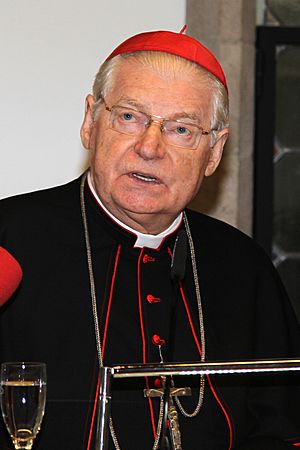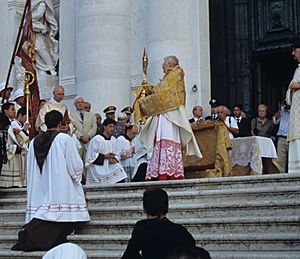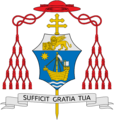Angelo Scola facts for kids
Quick facts for kids His Eminence Angelo Scola |
|
|---|---|
| Cardinal, Archbishop Emeritus of Milan | |

Cardinal Scola in 2014.
|
|
| Church | Roman Catholic Church |
| Archdiocese | Milan |
| Metropolis | Milan |
| See | Milan |
| Appointed | 28 June 2011 |
| Enthroned | 25 September 2011 |
| Reign ended | 7 July 2017 |
| Predecessor | Dionigi Tettamanzi |
| Successor | Mario Enrico Delpini |
| Other posts | Cardinal-Priest of Santi XII Apostoli (2003–present) |
| Orders | |
| Ordination | 18 July 1970 |
| Consecration | 21 September 1991 by Bernardin Gantin |
| Created Cardinal | 21 October 2003 |
| Rank | Cardinal-Priest |
| Personal details | |
| Birth name | Angelo Scola |
| Born | 7 November 1941 Malgrate, Kingdom of Italy |
| Previous post |
|
| Motto | Latin: Sufficit gratia Tua (Your Grace Suffices) |
| Signature | |
| Coat of arms |  |
Angelo Scola, born on November 7, 1941, is an important Italian leader in the Catholic Church. He is a Cardinal, a philosopher, and a theologian. From 2011 to 2017, he served as the Archbishop of Milan. Before that, he was the Patriarch of Venice from 2002 to 2011. He became a bishop in 1991 and a cardinal in 2003.
Contents
Biography of Angelo Scola
Early Life and Education
Angelo Scola was born in Malgrate, Italy. His father, Carlo Scola, was a truck driver. Angelo was the younger of two sons. He went to high school in Lecco and was part of a youth group called Gioventù Studentesca.
He studied philosophy at the Catholic University of the Sacred Heart. He earned his doctorate there in 1967. During his university years, he was a leader in a Catholic student group.
Scola then decided to study for the priesthood. He attended a seminary in Milan. In 1969, he moved to another seminary in the Diocese of Teramo-Atri. He was ordained as a priest on July 18, 1970, by Bishop Abele Conigli.
He continued his studies and earned another doctorate in theology from the University of Fribourg, Switzerland. He wrote his paper on St. Thomas Aquinas. Scola also worked as an editor for a religious journal called Communio.
After his studies, Scola taught at different universities. From 1979, he was a research assistant and then a professor at the University of Fribourg. Later, he taught at the Pontifical John Paul II Institute for Studies on Marriage and Family and the Pontifical Lateran University in Rome. He helped many foreign students study in Italy by setting up scholarships.
Becoming a Bishop
Angelo Scola became the Bishop of Grosseto on July 18, 1991. He was officially consecrated as a bishop on September 21, 1991. His motto as a bishop was Sufficit gratia tua, which means "Your grace suffices."
As Bishop of Grosseto, he focused on helping young people and improving religious education. He also worked to support families and workers in the area. He even wrote a book for young people about the Church's role in education.
Leadership in Rome
In 1995, Scola left his role as Bishop of Grosseto. He became the head, or rector, of the Pontifical Lateran University in Rome. He also became the president of the Pontifical John Paul II Institute for Studies on Marriage and Family.
During this time, he joined several important groups in the Roman Curia, which helps the Pope manage the Catholic Church. He was a member of the group for clergy and the group for health workers. He also worked with the Pontifical Council for the Family.
Later, in 2009, Pope Benedict XVI appointed him to the Pontifical Council for Culture. In 2011, he joined the new Pontifical Council for the Promotion of the New Evangelisation.
Patriarch of Venice

On January 5, 2002, Scola was appointed Patriarch of Venice. This is a very important position in the Catholic Church. On October 21, 2003, he was made a Cardinal-Priest.
As Patriarch, Cardinal Scola was known for being open and caring. He would set aside time each week to meet with anyone who wanted to talk to him. In 2004, he started an academic institute called the Studium Generale Marcianum. He also launched a journal called Oasis. This journal was published in many languages, including Arabic and Urdu, to connect with Christians in Muslim countries.
After Pope John Paul II passed away in 2005, Cardinal Scola was considered a possible candidate to become the next Pope. However, Joseph Ratzinger was chosen instead.
Archbishop of Milan
On June 28, 2011, Cardinal Scola was appointed the Archbishop of Milan. This is another very important role in the Catholic Church. He officially took on this role on September 25, 2011.
In Milan, he continued his work within the Church's leadership. He became a member of the Congregation for the Oriental Churches and the Congregation for the Doctrine of the Faith. Cardinal Scola is also known for speaking several languages, including Italian, English, German, and French.
In 2013, Cardinal Scola was again considered a strong candidate to become Pope. However, Cardinal Jorge Bergoglio was elected. Pope Francis accepted Cardinal Scola's resignation on July 7, 2017, as he reached the retirement age for bishops. Bishop Mario Delpini became his successor. Cardinal Scola then retired to a village near Lake Annone.
Views and Beliefs
Working with Other Faiths
Cardinal Scola believes it is important for Catholics and Muslims to work together. He thinks they have many things in common, especially when it comes to helping Christians who are facing difficulties in the Middle East. He met with the Patriarch of Moscow Kirill in 2013 to discuss ways to cooperate.
He also feels it is his duty to connect with Orthodox Christians living in his archdiocese. He wants to make sure they have churches where they can worship. He believes that even if there are some differences in beliefs, it's important to work together on common issues like family, justice, and life.
Understanding the Second Vatican Council
In 2012, Cardinal Scola spoke about the Second Vatican Council. This was a very important meeting of Catholic bishops in the 1960s. He explained that the documents from this Council helped the Church grow and understand its teachings even better. He said that the Council's ideas fit well with the Church's long history.
Works and Writings
Cardinal Scola has written many books and articles. His writings cover topics like medical ethics, human relationships, and marriage and family. These works have been translated into several languages. He has also written more than 120 articles for scholarly journals.
Images for kids
See also
 In Spanish: Angelo Scola para niños
In Spanish: Angelo Scola para niños
 | Kyle Baker |
 | Joseph Yoakum |
 | Laura Wheeler Waring |
 | Henry Ossawa Tanner |


